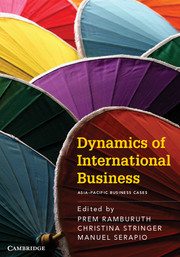Book contents
- Frontmatter
- Dedication
- Foreword
- Contents
- Contributors
- Preface
- Part I The Environment of International Business
- Part II Strategy and Entrepreneurship in International Business
- Part III Managing People in International Business
- 13 John Parker’s expatriate experiences in China
- 14 Dilemmas in working across cultures: Arun in a conundrum
- 15 Working in Chinese firms
- 16 Losing touch with the context: The story of Ravinaki Resort in Fiji
- 17 Foxconn: The complexity of quality control in a Chinese context
- 18 Quality through culture: Organisational development at New American Ice Cream
- Part IV Operating in International Markets
- References
14 - Dilemmas in working across cultures: Arun in a conundrum
Published online by Cambridge University Press: 05 August 2013
- Frontmatter
- Dedication
- Foreword
- Contents
- Contributors
- Preface
- Part I The Environment of International Business
- Part II Strategy and Entrepreneurship in International Business
- Part III Managing People in International Business
- 13 John Parker’s expatriate experiences in China
- 14 Dilemmas in working across cultures: Arun in a conundrum
- 15 Working in Chinese firms
- 16 Losing touch with the context: The story of Ravinaki Resort in Fiji
- 17 Foxconn: The complexity of quality control in a Chinese context
- 18 Quality through culture: Organisational development at New American Ice Cream
- Part IV Operating in International Markets
- References
Summary
Arun Gupta was born in northern India and trained in the United Kingdom as a professional accountant. He enjoyed his life in the United Kingdom, and opted to remain there to further his career after he had finished his studies. While the United Kingdom was different from India in many ways, he felt he had adjusted well to his host country. He attributed part of his success in cross-cultural adaptation to his background, as he had had been exposed to an essentially British system of education in India.
After many years of experience in his field in the United Kingdom, he decided he was ready to venture further abroad and seek work opportunities in an accounting company in another country. With the increased globalisation of business, accountants with significant international experience are highly valued, and can often command higher salaries within their organisations. Arun began considering worldwide options for a location in which he could continue to develop his professional skills while enhancing his CV with international experience. After talking to friends and colleagues, he began to focus his search on South Korea. Arun had a personal interest in Korean culture: his girlfriend was of Korean ancestry, having immigrated to the United Kingdom with her parents when she was a young child, and her family had introduced him to some of the highlights of Korean culture – including Korean food, which he had come to enjoy. He had even taken a Korean cooking class in London to learn how to make his favourite dish, bibimbap (a signature dish in the Korean cuisine). His girlfriend was keen to move to Korea with him, both to reconnect with her culture and to seek further career opportunities. There were good employment prospects for a fully bilingual English/Korean businessperson in Asia, and the financial crisis in Europe was limiting career advancement opportunities for both of them in the United Kingdom. A move to Korea seemed like a great idea for both of them, personally as well as professionally.
- Type
- Chapter
- Information
- Dynamics of International Business: Asia-Pacific Business Cases , pp. 145 - 151Publisher: Cambridge University PressPrint publication year: 2013

